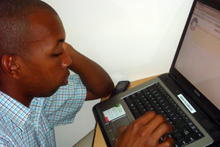
Growing the Global iHRIS Community, One Bounty at a Time
More than a dozen countries are implementing CapacityPlus's open source iHRIS software, which provides information for health leaders to track, manage, and plan their health workforce. CapacityPlus, along with other projects and organizations, provides assistance to these countries to install and adapt the software for local needs. As more countries continue to express interest in iHRIS, CapacityPlus is striving to broaden and strengthen a global community of people that can help support and sustain the software.
 CapacityPlus recently began offering “code bounties” to incentivize more open source developers to contribute to advancing iHRIS. Code bounties are small projects with narrow scopes of software development work and small monetary awards.
CapacityPlus recently began offering “code bounties” to incentivize more open source developers to contribute to advancing iHRIS. Code bounties are small projects with narrow scopes of software development work and small monetary awards.
So far, CapacityPlus posted three code bounties, aimed at improving the iHRIS software documentation, translating the software into Arabic, and ensuring iHRIS data can be shared with other health information systems. Sovello Mgani, a developer in Tanzania, applied for and won the first bounty. With this award, he will create documentation to guide the decentralization of iHRIS to districts in Ghana.
The code bounties follow the successful model of innovative and collaborative approaches used by CapacityPlus and several other USAID-funded and IntraHealth International-led projects to establish the iHRIS developer community. For instance, the Uganda Capacity Program offers an internship program for local developers; the Tanzania Human Resource Capacity Project partners with a university information science department; and CapacityPlus collaborates with the West African Health Organization and West African developers to implement the software in the region.
This work has resulted in several noteworthy achievements for iHRIS over the last year, including the forthcoming iHRIS Retain, which was developed by two developers from the internship program in Uganda and is the first iHRIS product to be coded-in-country. More recently, the Department of Computer Science and Engineering of the University of Dar es Salaam received an award from the World Health Organization to assist the Ministry of Health and Sanitation in Sierra Leone with customizing and deploying iHRIS, an example of true South-to-South collaboration leveraging USAID’s investment and CapacityPlus’s technical leadership.
As more code bounties are offered and completed, the pool of qualified iHRIS developers will grow and the skills of these developers will expand. From here, these developers can start offering their expertise directly to ministries of health, professional health councils, or other organizations in additional countries that also want to implement iHRIS.
Related items:
Photo courtesy of Sovello Mgani.


